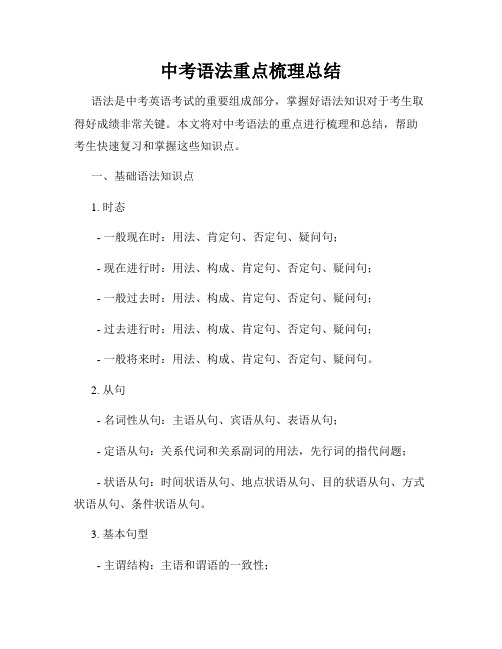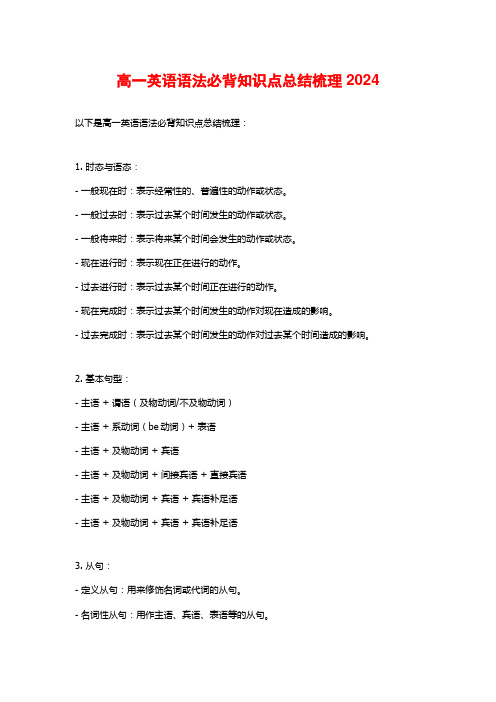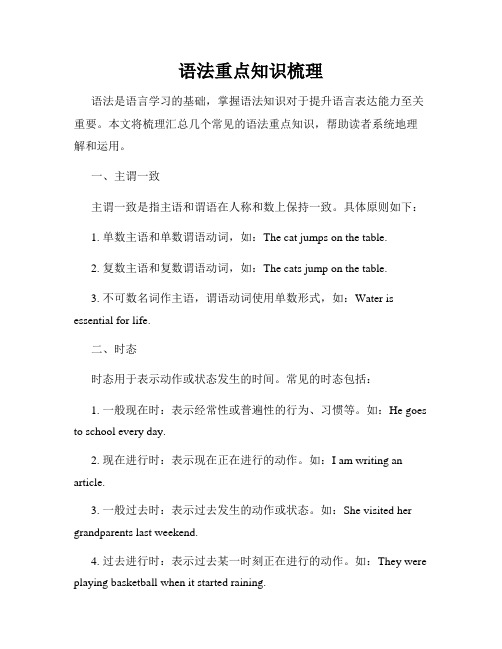语法知识梳理
中考语法重点梳理总结

中考语法重点梳理总结语法是中考英语考试的重要组成部分,掌握好语法知识对于考生取得好成绩非常关键。
本文将对中考语法的重点进行梳理和总结,帮助考生快速复习和掌握这些知识点。
一、基础语法知识点1. 时态- 一般现在时:用法、肯定句、否定句、疑问句;- 现在进行时:用法、构成、肯定句、否定句、疑问句;- 一般过去时:用法、构成、肯定句、否定句、疑问句;- 过去进行时:用法、构成、肯定句、否定句、疑问句;- 一般将来时:用法、构成、肯定句、否定句、疑问句。
2. 从句- 名词性从句:主语从句、宾语从句、表语从句;- 定语从句:关系代词和关系副词的用法,先行词的指代问题;- 状语从句:时间状语从句、地点状语从句、目的状语从句、方式状语从句、条件状语从句。
3. 基本句型- 主谓结构:主语和谓语的一致性;- 主谓宾结构:动宾搭配、及物动词和不及物动词; - 主系表结构:系动词的用法、表语的形式。
二、常见错误类型及纠正方法1. 词性错误- 形容词和副词的用法区别;- 名词和动词的转化。
2. 时态错误- 部分考生容易混淆不同时态的用法;- 注意句子的上下文语境,选择正确的时态。
3. 代词错误- 指代不明确,造成语义模糊;- 注意先行词和代词在语法和逻辑上的一致性。
4. 介词错误- 介词搭配的固定搭配用法;- 注意特殊动词和介词的搭配。
三、复合句的连接词1. 并列连接词- and, but, or, so等的用法和区别;- 注意使用上的逻辑连贯和前后句之间的平衡。
2. 引导性连接词- because, if, when, while等的用法;- 注意从句与主句之间的逻辑关系。
3. 状语连接词- before, after, since等的用法;- 理解并正确运用时间、地点和条件等状语从句。
四、易混淆的语法知识点1. 动词时态和语态的区别;2. 定语从句和状语从句的区别;3. 直接引语和间接引语的句式转换。
五、巩固方法与技巧1. 多做语法练习题,掌握各类语法知识的运用;2. 利用语法书籍和教辅材料进行针对性的学习;3. 多听、多读、多写,培养语感和理解能力。
课文语法知识点的梳理

课文语法知识点的梳理在学习语法时,了解课文中的语法知识点是非常重要的。
通过对课文语法进行梳理,我们可以更好地理解和应用语法规则。
本文将从三个方面探讨课文中的语法知识点,分别是句子结构、词汇运用和时态使用。
一、句子结构1. 主谓结构:课文中的简单句多采用主谓结构,即句子由主语和谓语构成。
例如:“I love to read books.”(我喜欢阅读书籍)2. 并列句:有时候课文也会使用并列句来增加句子的表达力。
例如:“He was tired, but he kept running.”(他很累,但是他坚持跑下去)3. 句子的修饰语:课文中也会出现形容词和副词对句子进行修饰,使句子更加具体和生动。
例如:“The beautiful flower bloomed in the garden.”(美丽的花朵在花园中绽放)二、词汇运用1. 名词的使用:课文中常出现各种各样的名词,通过学习课文可以了解名词在不同语境下的用法和搭配。
例如:“I have a dog named Max.”(我有一只名叫马克斯的狗)2. 动词的时态:课文中的动词时态多样,可以了解到动词的不同变化形式和时态的运用。
例如:“She plays the piano every day.”(她每天弹钢琴)3. 介词的搭配:课文中的介词搭配可以帮助我们掌握介词在句子中的正确用法。
例如:“The cat jumped onto the table.”(猫跳到了桌子上)三、时态使用1. 一般现在时:课文中常出现一般现在时,以描述现实情况、经常发生的动作或客观事实。
例如:“I wake up at 7 o'clock every morning.”(我每天早上7点醒来)2. 一般过去时:有时候课文会使用一般过去时,来叙述过去发生的事情或状态。
例如:“Yesterday, I visited my grandparents.”(昨天,我去拜访了我的祖父母)3. 将来时:在课文中,也会出现将来时,用来描述将来要发生的动作或事件。
语法知识点梳理

语法知识点梳理一、介词介词是连接词与词之间关系的词语,主要有时间介词、地点介词、方向介词和目的介词等。
例如:1. 时间介词:- at:在某个具体时间(at 6 o'clock,在六点)- in:在某个时间段内(in the morning,在早上)- on:在某天或日期(on Monday,在星期一)2. 地点介词:- at:在某点、地方或方位上(at the park,在公园)- in:在某个范围或地区内(in the city,在城市)- on:在某个表面或位置上(on the table,在桌子上)3. 方向介词:- to:表示朝某一目的地(go to school,去学校)- into:表示进入某个位置(go into the room,进入房间)4. 目的介词:- for:表示为了某个目的(study for the exam,为了考试而学习)二、动词时态动词时态表示动作发生的时间,包括过去时、现在时和将来时。
例如:1. 过去时:- 一般过去时:表示过去某个时间发生的动作或存在的状态(I went to the park yesterday,我昨天去了公园)2. 现在时:- 一般现在时:表示经常性、习惯性的动作或普遍真理(I often go to the gym,我经常去健身房)- 现在进行时:表示现在正在进行的动作(She is reading a book,她正在看书)3. 将来时:- 一般将来时:表示将来某个时间要发生的动作(I will call you tomorrow,我明天会给你打电话)三、句子结构句子结构包括主语、谓语、宾语和其他成分的组合,可以是简单句、复合句或并列句等。
例如:1. 简单句:只包含一个主谓结构,表达一个完整的意思(I love you,我爱你)2. 复合句:包含一个主句和一个或多个从句,从句可以是名词从句、形容词从句或副词从句等(He told me that he would come tomorrow,他告诉我他明天会来)3. 并列句:由两个或多个独立的句子组成,通过连接词或标点符号进行连接(She is reading a book, and he is watching TV,她正在读书,他正在看电视)四、限定词限定词用于限定名词的范围或数量,包括冠词、数词和代词等。
高中语法知识总结系统梳理和总结语法知识点

高中语法知识总结系统梳理和总结语法知识点语法是语言学中非常重要的一个分支,它研究语言的结构、规则和运用。
在学习语言的过程中,掌握语法知识是非常必要的。
本文将对高中语法知识进行总结和梳理,系统地介绍各个语法知识点及其用法。
一、名词名词是指表示人、事物、动物、地点等具体或抽象事物名称的词语。
在句子中,名词通常作为主语、宾语、表语或定语。
1. 单数名词单数名词表示一个事物或人物,如:"book"(书)、"cat"(猫)。
2. 复数名词复数名词表示多个事物或人物,通常在词尾加上-s或-es,如:"books"(书籍)、"cats"(猫咪)。
3. 不可数名词不可数名词表示抽象的概念、液体、物质等,一般不能用于复数形式,如:"water"(水)、"knowledge"(知识)。
二、代词代词是用来代替名词或其他代词的词语。
它可以在句子中作不同的成分,如主语、宾语、定语等。
1. 人称代词人称代词用来代替人或事物的称呼,包括第一人称(I)、第二人称(you)和第三人称(he、she、it)。
2. 物主代词物主代词表示所属关系,包括形容词性物主代词和名词性物主代词,如:"mine"(我的)、"yours"(你的)、"hers"(她的)、"its"(它的)。
3. 反身代词反身代词表示动作的主体是其本身,如:"myself"(我自己)、"yourself"(你自己)。
三、动词动词是表示动作或状态的词语,它可以单独构成谓语或与助动词连用。
1. 动词的时态动词的时态是表示动作发生的时间,包括一般现在时(Simple Present)、一般过去时(Simple Past)、现在进行时(Present Continuous)等。
现代汉语语法知识梳理及常见错误解析

现代汉语语法知识梳理及常见错误解析第一章:现代汉语语法基础在学习现代汉语语法时,首先需要了解现代汉语的语法基础知识。
现代汉语是一种以汉字为书写符号的语言,它具有丰富的语法结构和规则。
下面将从词汇、句子和基本语法规则等方面介绍现代汉语语法的基础知识。
词汇分类在现代汉语中,词汇可以分为实词和虚词两大类。
实词是具有实际意义的词汇,如名词、动词、形容词等;虚词则是起连接作用或表示语法关系的词汇,如连词、介词、助词等。
了解词汇的分类有助于我们正确理解句子结构和语法规则。
句子结构与成分句子是语言的基本单位,它由主语、谓语、宾语等成分构成。
主语一般表示动作的执行者,谓语表示动作或状态的内容,宾语表示受动作影响的人或事物。
另外还有状语、定语等成分对句子进行修饰和扩展。
正确理解句子结构和成分对于准确表达意思至关重要。
基本语法规则现代汉语具有一套基本的语法规则,包括主谓一致、时态的准确运用、语序的规范等。
不同于英语等语言,现代汉语的语序较为灵活,但在表达意思的清晰和准确方面仍有一定的规范要求。
熟悉基本语法规则有助于我们写出通顺、地道的汉语句子。
第二章:常见错误解析在学习现代汉语语法的过程中,常常会遇到一些语法错误。
下面列举了一些常见的语法错误及解析,希望能帮助读者避免在写作和交流中犯同样的错误。
误用虚词有些学习者容易在句子中误用虚词,例如连词的错误使用、介词与动词搭配错误等。
正确的虚词使用是确保句子连贯且表达准确的关键。
主谓不一致主谓不一致是一个常见的语法错误,指的是主语与谓语在人称、数或时态上不一致。
这种错误容易造成句子意思不清晰,应尽量避免发生。
语序混乱现代汉语的语序相对灵活,但过于混乱的语序容易使句子结构不清晰。
应注意在表达时遵循一定的语序规则,使句子更具可读性和表达力。
结语掌握现代汉语的语法知识对于提高汉语表达能力至关重要。
通过对现代汉语语法的梳理和常见错误的解析,希望读者能够更加熟练地运用汉语,写出规范、地道的句子。
高一英语语法必背知识点总结梳理2024

高一英语语法必背知识点总结梳理2024 以下是高一英语语法必背知识点总结梳理:1. 时态与语态:- 一般现在时:表示经常性的、普遍性的动作或状态。
- 一般过去时:表示过去某个时间发生的动作或状态。
- 一般将来时:表示将来某个时间会发生的动作或状态。
- 现在进行时:表示现在正在进行的动作。
- 过去进行时:表示过去某个时间正在进行的动作。
- 现在完成时:表示过去某个时间发生的动作对现在造成的影响。
- 过去完成时:表示过去某个时间发生的动作对过去某个时间造成的影响。
2. 基本句型:- 主语 + 谓语(及物动词/不及物动词)- 主语 + 系动词(be动词)+ 表语- 主语 + 及物动词 + 宾语- 主语 + 及物动词 + 间接宾语 + 直接宾语- 主语 + 及物动词 + 宾语 + 宾语补足语- 主语 + 及物动词 + 宾语 + 宾语补足语3. 从句:- 定义从句:用来修饰名词或代词的从句。
- 名词性从句:用作主语、宾语、表语等的从句。
- 状语从句:用来修饰动词、形容词、副词等的从句。
4. 形容词与副词的比较级和最高级:- 一般形容词比较级:原级 + er。
- 一般形容词最高级:原级 + est。
- 一般副词比较级:原级 + er。
- 一般副词最高级:原级 + est。
5. 句子成分:- 主语- 谓语- 宾语- 表语- 定语- 状语6. 虚拟语气:- 虚拟条件句:表示与事实相反或与实际情况不符的假设。
- 虚拟语气的使用:表示愿望、建议、命令等。
- 与过去事实相反的虚拟:表达过去不可能实现的愿望或假设。
7. 时态与语态的转换:- 时态转换:根据具体语境和表达需要,将动词的时态进行转换。
- 语态转换:将主动语态转换为被动语态或将被动语态转换为主动语态。
8. 动词的非谓语形式:- 不定式:一般用作动词的基本形式,表示动作或状态的概念。
- 动名词:以-ing结尾,用作名词。
- 分词:以-ing或-ed结尾,用作形容词或副词。
语法重点知识梳理

语法重点知识梳理语法是语言学习的基础,掌握语法知识对于提升语言表达能力至关重要。
本文将梳理汇总几个常见的语法重点知识,帮助读者系统地理解和运用。
一、主谓一致主谓一致是指主语和谓语在人称和数上保持一致。
具体原则如下:1. 单数主语和单数谓语动词,如:The cat jumps on the table.2. 复数主语和复数谓语动词,如:The cats jump on the table.3. 不可数名词作主语,谓语动词使用单数形式,如:Water is essential for life.二、时态时态用于表示动作或状态发生的时间。
常见的时态包括:1. 一般现在时:表示经常性或普遍性的行为、习惯等。
如:He goes to school every day.2. 现在进行时:表示现在正在进行的动作。
如:I am writing an article.3. 一般过去时:表示过去发生的动作或状态。
如:She visited her grandparents last weekend.4. 过去进行时:表示过去某一时刻正在进行的动作。
如:They were playing basketball when it started raining.5. 将来时:表示将来要发生的动作或状态。
如:I will go shopping tomorrow.6. 完成时态:表示过去某一时刻之前已经完成的动作。
如:She had already finished her homework when I called her.三、从句结构从句是由一个主句和一个或多个从句构成的句子。
根据从句的功能和引导词,可以分为三类:1. 定语从句:用来修饰名词或代词的从句,通常由关系代词(that, which, who/whom, whose)引导。
如:The book that I bought yesterday is very interesting.2. 状语从句:用来修饰主句谓语动词的从句,常见的引导词有连词(when, while, before, after, since)和关系副词(where, why, how)。
语法知识梳理

语法知识梳理语法是语言学中的重要分支,它研究语言规则和结构,以及各种句子成分之间的关系。
掌握基本的语法知识对于我们有效地交流和表达意思至关重要。
本文将对常用的语法知识进行梳理,包括句子结构、词类、时态和语态等方面,帮助读者更好地理解和应用语法规则。
一、句子结构句子是语言交流中最基本的单位,它由主语、谓语和宾语构成。
主语是句子中起主要作用的名词或代词,谓语是描述主语的动作或状态的动词,而宾语是动作的承受者或对象。
在句子结构中,它们的位置和关系决定了句子的语法正确与否。
主语:张三谓语:喜欢宾语:音乐二、词类在语法中,词类是指词语按照功能和用法的不同划分的类别,常见的词类包括名词、动词、形容词、副词、介词、连词和代词等。
1. 名词:表示人、事物、地点、抽象概念等具体或抽象的名词。
例句:这个学校有很多优秀的学生。
2. 动词:表示动作、状态或存在的词语。
例句:他正在读一本有趣的书。
3. 形容词:修饰名词或代词,表示人或事物的性质、特征等。
例句:这是一本有趣的故事书。
4. 副词:修饰动词、形容词、副词或句子,表示时间、地点、程度等概念。
例句:他很快地跑来了。
5. 介词:表示时间、地点、原因、目的等关系,常与名词或代词搭配使用。
例句:他在桌子上放了一杯水。
6. 连词:连接词与词、短语、从句等,使其在语法上构成句子的一部分。
例句:我喜欢读书,也喜欢写作。
7. 代词:替代名词的词语,用来指代、引导、替代名词。
例句:我见到他的时候,他笑得很开心。
三、时态和语态时态和语态是语法中的重要概念,时态表示动作的发生时间,而语态表示动作的进行者和承受者。
1. 时态:通常分为过去、现在和将来三种时态,每种时态还包括简单、进行和完成等不同形式。
- 过去时态:表示过去发生或已经结束的动作或状态。
例句:昨天我去了一趟图书馆。
- 现在时态:表示当前正在进行或经常发生的动作或状态。
例句:他正在写一封电子邮件。
- 将来时态:表示将来发生的动作或状态。
- 1、下载文档前请自行甄别文档内容的完整性,平台不提供额外的编辑、内容补充、找答案等附加服务。
- 2、"仅部分预览"的文档,不可在线预览部分如存在完整性等问题,可反馈申请退款(可完整预览的文档不适用该条件!)。
- 3、如文档侵犯您的权益,请联系客服反馈,我们会尽快为您处理(人工客服工作时间:9:00-18:30)。
语法知识梳理一.主谓一致1.Mr Li as well as his family ____at home.Mr Li, together with his family, ____at home.Mr Li, along with his family, ____ at home.2.The whole nation ____ in deep sorrow, hearing the sad news.The whole family ____ watching TV.The whole family ____ a nice family.3. A variety of books ____bought yesterday.A number of books ____ bought yesterday.A set of books ____bought yesterday.A series of books ____bought yesterday.One and a half years ____ passed.Quantities of books ____ bought yesterday.A quantity of books ____bought yesterday.A quantity of water ____ bought yesterday.This kind of books ____nice.Books of this kind ____nice.These kinds of books ____ nice.4.The iron and steel industry ____ the key link in socialist production.Our monitor and secretary ____respectable.5.An iron and steel works, with some satellite factories, ____to be built here next year.6.The poor / the rich / the young ____here now.Either he or you ____right.Neither you nor he ____ right.Either ____ right.____ neither he nor you in the classroom?Fifty percent of the students ____League members.Seventy percent of the surface of the earth ____ covered with water.7.What he left us ____ many books.It was you, not I who ____too much dependent on medicine and never did exercise. 二.冠词1. He is ____ Leifeng of our time.2. This provides ____ source of information.3. He made ____ study of history.4. This kind of animals has little connection with ____ different kind of animals.This kind of animals has little connection with animals of ____ different kind.5. Would it be possible for me to have ____ second appointment for ____ week from today.6. have ____good knowledge of Englishhave ____ good command of Englishmake ____ survey on…have ____large vocabulary at one’s command.____mountain range / ____range of mountains (山脉)(Drive a new motorway across a mountain range.)have____ big breakfast7. To be an inventor, one needs ____ very vivid imagination.8.pay sb. by ____ hourinvent____ telephone / computer (发明物)____English languageMaths is ____ language of science.Biology is ____science of life.____sun / moon / earth (独一无二东西前用)in ____universe____ poor / rich / young (一类人前用)____Philippines (群岛前用)但:Taiwan Island____ … mountains (山脉前用)但:Tai Mountain / Mount Tai9.以下短语中不用冠词conquer naturewalking in space / walking in outer spacespeak in publicgo to church / attend church (做礼拜)finish schoolattend schoolbe in hospitalbe sent / rushed to hospitalbe sent / be put / be thrown into prisonlose heart三.形容词与副词1.much / even /still / a lot / far / many more2.far / much too … to…3.I have never met a better singer.4.He is by far the tallest.He is taller by far.Of the two boys, he is by far the taller.5.He is too good a teacher for me to give up.He is as good a teacher as Susan.6.This room is three times bigger than … / three times as big as … / three times the size of …(The Black Sea was a fresh water lake about two-thirds its present size and unconnected with the Mediterranean 1000 years ago.)7.He gets twice as much as ____ (I, mine)His income is twice as much as ____ (I, mine)8.The more exercise you do every day, the ____ it will do to you. (more good, better )9.as far as No. 1 Department Store (远到)as long as two metres (长达)as deep as two metres (深达)As far as I know, …(据我所知)As long as / so long as you work hard, …(只要)as many as 70 percent of students10.go deep under the muddive deep in the seadig deepjump highfly highopen your mouth widefly high in the skyarrive home safewash your hands cleanpraise sb highlybe deeply moved11.no more than 仅仅/ not more than 至多(no such person / not such a person 没有这种人的)四.倒装结构1.So hard does he study that he has made great progress.2.Were I you, I would learn English.3.No sooner…than…Hardly…when…/ Scarcely… when …/ Barely … when…4.Only then / when he was ten, did he realize the importance of learning English.Such will be our home in the future.5.He arrived at a farm house, in front of which sat a small boy.The ground is clean, on which sat a group of students playing games.South of the lake lies the village in which lives an old man whose son is in the army.6.By no means will China be the first to use unclear weapon.On no account must we relax our vigilance.At no time will China be the first to use nuclear weapon.He was so careful that not a single mistake did he make.If he doesn’t want to go there tomorrow, neither will I.7.Hard as he works, …Hard though he works, …五.虚拟语气1. It is necessary that … (虚拟语气用在主语从中)suggestednaturalimpossibleimportant + (should) doshamestrangea pityno wonderanxious2.If it were not for the fact that you are ill, I wouldn’t let you stay at home.1.Without your help, I would n’t have made great progress.But for your help, I wouldn’t have made great progress.You helped me a lot last time, otherwise I would n’t have made great progress.2.Even if I had known her address I might not have had time to write to her.3.It is required that the subject referred to be discussed immediately.六.从句(一)主语从句1.What a foreign language is is known to all.2.It is known to all that China is a great country.As is known to all, China is a great country. (定语从句)3.That mathematics is one of the most useful and fascinating divisions of human knowledge iswidely accepted.(二)定语从句1.Gone are the days ____ we relied on them. (when, which )2.The days ____ we relied on them are gone forever. (when,which)3.This was the reason, ____ he was late for the meeting yesterday. (for which, why )4.This was the reason ____he was late for for the meeting yesterday. (which, why )5.This was the reason ____ he explained to us for his being late ( why, which )6.The one ____ we thought had moved to another city is still in Shanghai. (whom, who )7.I don’t like the way ____ you speak to your mother. ( /, which )8.At this critical moment, we badly need a mayor to handle this difficult situation, ____ everycitizen has confidence. (whom, in whom )9.This is the person ____ honour the state dinner was given (in whose, of whom)10.I can think of many cases ____ students obviously knew a lot of English words andexpressions but couldn’t write a good essay. (where, which)11.We have reached the point / stage ____reforms are badly needed. (where, which)(三)宾语从句1.He asked ____ that made him so sad. (what it was, what was it)2.He asked ____ with you. (what was the matter, what the matter was)3.What do you think has happened to him?4.Where do you suppose they have gone?(四)表语从句1. The reason why he was late for the meeting yesterday was ____ he was ill. ( that, because )2. That’s ____ you are wrong. To give him whatever he wants will only spoil him. ( where, why )(五)同位语从句1. Bob expressed the hope ____if possible, he would come and visit Shanghai again. ( that, / )2. Word came ____our football team beat their team in the match yesterday. (that, which) (六)状语从句1. Put the book ____ it was. ( where, which, what )2. He succeeded ____ other experienced experts failed. ( where, which, what)3. I have kept this picture ____ I can see it every day. (where, which, what)4. You should be firm ____ you think yourself to be right ( where, which, what )5. When you read, place pause ____ there is a full stop. (where, which, what)6. He will have finished all the work by the time he ____. (graduates, will graduate)(七)名词性从句1. He was born in ____ is now Shanghai. (what, /, which )2. Although website do make money, in the current phase of Internet development,____ they earn is far from enough to satisfy their needs. (what, which, / )3. We firmly believe that reading is to the mind ____ exercise is to the body. (what, which, / )4. When the European settler arrived in ____ is now the United States, they brought their holiday like Christmas. (what, /, which )5. ____ what has recently been done to provide more buses for the people, a shortage of public vehicles remains a serious problem. ( Tough, In spit of )6. He drove at ____ we thought was a dangerous speed. ( what, which)7. They built a house in ____ was a waste land ten years ago. ( what, where)七.非谓语动词(一)作定语1. The building being built now is our library.2. The building built last year is …3. The building to be built next year will be …(二) 作状语1. Be careful when ____the street. (crossing , crossed )2.Though ____ in Boston, Mr Wang works and lives in Chicago. ( born, being born )3. Though ____ many times, he still didn’t know how to do it. (having been taught, taught)4. ____ many times, he still didn’t know how to do it. (Having been taught, taught)5. ____ where to go, he went to ask the police. (Not knowing, Not having known )6. The meeting____ over, we went home. (being, was)7. ____ a book in his hand, he went into the classroom. (Holding, Held )8. ____ book in hand, he went into the classroom. ( /, Holding )9. With a book ____in his hand, he went into the classroom. ( /, holding )10. He left home, never ____. (returning, to return )(三)作宾语补足语1. Parents are planning to have their children ____ abroad. (educated, educating)2. He was listened to ____ at the meeting. ( to speak, speaking)八.反义疑问句1. There used to be a bookstore at the corner of the street, __________ ?2. Nobody knows it , __________?3. You don’t think he will come today, __________?4. You’d better come tomorrow, __________?5. I wish to go to your home this evening, __________?6. This is a nice book, __________?7. That is a nice book, __________?8. These are nice books, __________?9. Those are nice books, __________?10. Mr Wang told me that you would go to Beijing, __________?11. Mr Wang told you that he would go to Beijing, __________?12. Neither of the young men who had applied for a position in the university was accepted, __________?13. What he said at the meeting yesterday was interesting, __________?14. There is no light in the room. They must have gone to the cinema, __________?15. You don’t know it, but he knows it, __________?16. This is the third time you have been late this week, __________?17. Tom, you wash the bow today, __________?九.强调结构1. It ____ Mr Wang and Mr Li that helped me yesterday. (was, were)2. It was in the room ____ we had a meeting yesterday____ I met him. ( where, that; where, that )3. It was in the room ____ I met the person ____ helped me last time. (that, who; where, that) 十.“It”的用法1. Space exploration has been made ____ with the development of modern science.(it possible, possible)2. Modern science has made ____for scientists to explore space.(it possible, possible)十一. 主动形式表示被动意思1.It writes smoothly,2.It sells well.3.The door won’t open.4.This kind of cloth washes easily.5.This kind of cloth dries easily.6.This book is worth reading.7.The classroom needs cleaning.。
